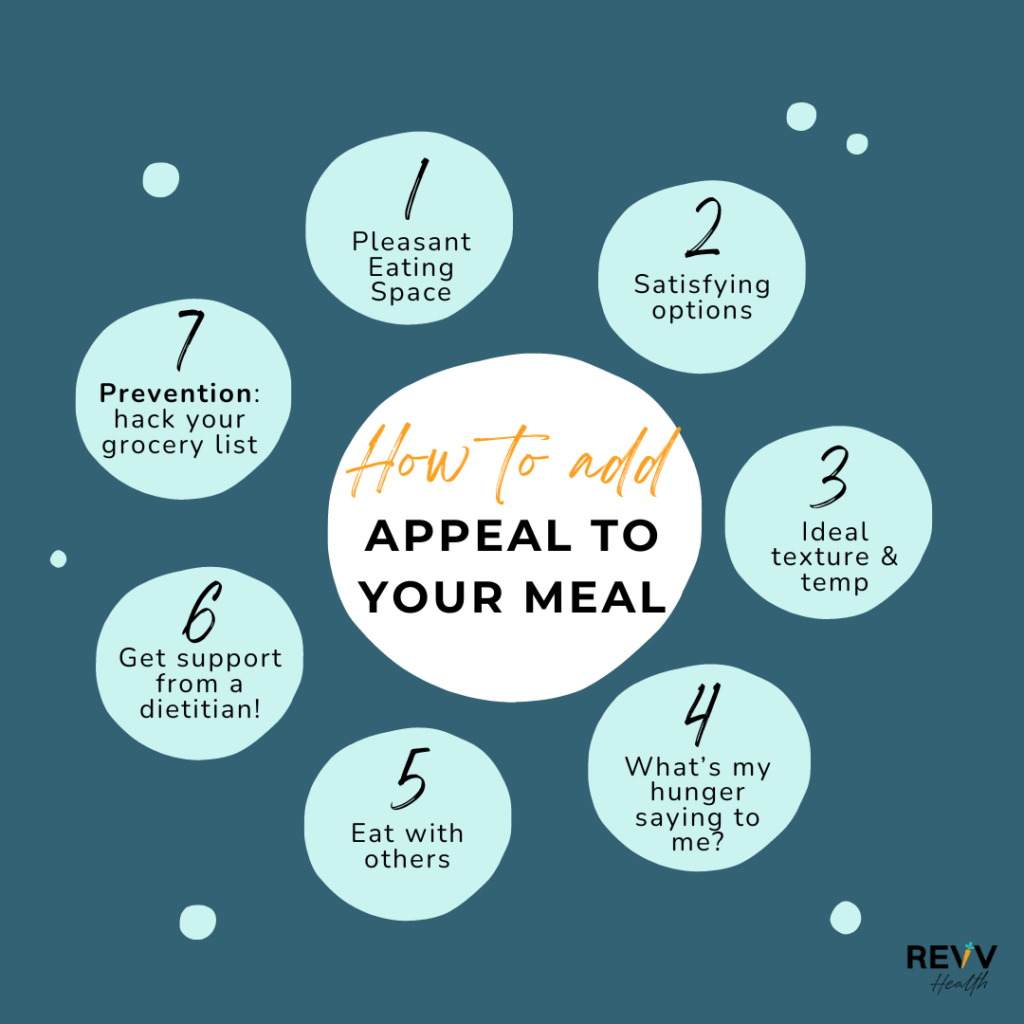Listen to this article:
Ever find yourself hanging on the door of your fridge while staring into a vast sea of food with the thoughts, “I’m hungry but nothing sounds good?”
Yep, I’ve been there, too (even as dietitian who eats intuitively!).
Hi, I’m Marissa, dietitian and executive nutrition coach for high-achieving perfectionists who struggle with disordered eating patterns and weight cycling. I love helping people become attuned to their body’s needs in order to unlearn food perfectionism and become a competent eater. When you’re a competent eater, you’re more mindful when you’re eating and have a healthier relationship with food.
In this article, I am going to help you with tips about how to decide what to eat when nothing sounds good, how to make food decisions while grocery shopping, and how to nourish your body and mind when responding to physical hunger.
But first, why does nothing sound good?
Wondering why nothing sounds good to eat when you’re hungry?
Stress, food repetition, boredom, medications, and environment can all play a big role.
The good news is — you’re not alone! So many of my clients struggle with how to understand their hunger, and it doesn’t only involve how we feel physically.
Below, I have listed a snapshot of why you might be feeling hungry but can’t find something to eat.
- “Empty fridge syndrome”
Okay, so I made that term up, but isn’t it the truth? When the food you want to eat is not physically present inside of your home then at a very basic level, it will be hard to satisfy yourself. We’ll talk all about what you can do in this scenario later on with some grocery hacks!
- Stress & anxiety
Stress can really put a damper on your appetite. According to the American Psychological Association, high stress levels can make food seem less appealing.
- Food fatigue
Sick of the same old meals? Eating the same things day in, and day out can make food lose its appeal.
- Boredom eating
Sometimes, it’s not hunger calling; it’s plain old boredom! It is easy to confuse emotional hunger with physical hunger. If you want to dive into this concept deeper, I have 12 Tips to learn how to stop eating when bored, which offer solid, evidence-based strategies to get to the bottom of emotional eating.
- Medication
Certain meds such as antibiotics, antidepressants, and chemotherapy drugs, can mess with your taste buds or even turn you off to certain foods altogether. If you are noticing these types of side effects happening often, talk with your doctor or psychiatrist.
- Blame the environment
Surprisingly, your surroundings can seriously impact your appetite. Unpleasant smells, a sink full of dirty dishes, or the way food is presented can sometimes really kill the vibe.
- Past experiences with diet culture
Negative experiences with food, or struggles with disordered eating or an eating disorder, can make mealtime a bit of a minefield. This is especially true if you have a history of perfectionism and food rules that prevent you from putting together a satisfying meal. If you’re someone who has had a hard time making peace with food, you are in the right place here!
The takeaway here?
There are a lot of reasons why it can feel tricky to connect with just the right meal or snack. Finding the right solution depends on knowing what is going on to begin with.
Now that we know some of the possible reasons why nothing is sounding good at the moment, let’s talk about solutions.
7 things to do when you’re hungry but nothing sounds good
Regardless of why you’re feeling like nothing sounds good, because this is different for everyone, eating enough when you are hungry will be top of the list!
Below, I’ve outlined 7 strategies that can not only help you figure out what to eat but also prepare “future-you” to look forward to your meals again.
Side note: Creativity with ingredients is impossible without a solid system for purchasing them. The first step? Make sure your pantry is stocked, food is consistently replenished, and you genuinely enjoy what you buy.
This approach, based on Satter’s food hierarchy of needs, fosters self-care through mindful eating and feeding. It lays the groundwork for becoming a competent eater.
1. Assess your food set-up
Having your favorite foods at home that both smell and look good can greatly influence your appetite. But before I help my clients dive into “the what of eating” (e.g., their meal planning, managing their health conditions, and their preferences), I like to help them assess their food environment.
Some questions to ask yourself:
- Does my eating space allow me enough room to prepare food comfortably?
- Are there any unpleasant odors or sights in my eating area that could affect my appetite?
- Do I have a comfortable spot to sit and eat without feeling cramped?
- Is my eating area well-lit and inviting?
2. Build a satisfying meal
When nothing sounds good enough, but you feel physically hungry, focus on preparing a mentally and physically fulfilling meal.
What this might look like:
- Food combinations: there are certain food combinations that affect your appetite. Even if nothing sounds good enough to eat, aim for a mix of protein, carbohydrates, and healthy fats, such as peanut butter and banana on a slice of your favorite bread. This will be important to relieve practical hunger. That said, it is better to eat anything that sounds good than to eat nothing at all, even if you’re unsure about what to eat.
- Comfort food: try to eat something that truly sounds good to you. Close your eyes and take a few deep breaths. What comes to mind? If you don’t have the food you want in your food environment, is there a way to assemble “the spirit of this meal?” As an example, I really love my grandmother’s crispy chicken, but she is no longer here to make this for me. I love her recipe, but when I don’t have time to make it, I recognize that something warm and crispy like this might suffice, which brings me to tip #3.
3. Explore textures and temperatures
Like I said above, when you can’t get whatever it is you want to eat (once you’ve determined what that is), sometimes recognizing the type of texture or temperature you want your meal to be is a great start.
Some questions to ask yourself:
- Do I want something crunchy?
- Do I crave something warm and comforting?
- Do I want it to be refreshing and cold?
- How about something creamy or smooth?
- Do I feel like something light and airy?
- Am I in the mood for something hearty and filling?
- Would a combination of textures add appeal to my meal? (Ooh, do I like how that sounds!)
- Should I choose a dish that’s crispy on the outside and tender on the inside?
When nothing seems appealing, these questions can begin to pique your interest in food.
4. Get to the bottom of your hunger
Diet culture has confused the hell out of my clients. How? They’ve been suppressing their true hunger in order to “achieve weight goals.”
So, it’s no wonder that you may feel hungry but don’t feel like eating if you have not allowed your body the permission to eat what it has needed over the years.
Here are some ways that you can recognize genuine hunger cues.
Ask yourself:
- Can I identify physical signs of hunger, such as a growling stomach or low energy levels?
- Am I finding it difficult to focus or concentrate?
- Do I recognize light-headedness or fatigue?
- Do I notice a decrease in my patience or irritability?
- When did I last eat?
- Am I low on energy?
- Am I basing my decision not to eat on arbitrary rules, like not eating too soon after a meal?
Even when nothing sounds good, hunger feels like different things to different people. You may experience all of the above as an example of practical hunger, or just one symptom.
What if you have determined you aren’t hungry?
Ask yourself:
- Have I been getting enough sleep? Fatigue can trigger cravings and affect appetite regulation.
- Am I eating meals that are not only nutritionally satisfying but also satisfy my taste buds?
- Am I eating balanced meals with a mix of protein, carbs, and fats to keep me feeling full and satisfied?
- Am I well-hydrated?
- Am I eating out of true hunger, or is boredom or stress driving my desire to eat?
- Have I been grazing all day?
- Am I undereating and then overeating when it comes to food?
Think of hunger as both a physical and mental cue to help you better understand your eating experience.
5. Eat with others
Sharing meals with colleagues, friends or family has its benefits, especially if you’re finding it is becoming harder to eat even when around food. Plus, it’s fun to spontaneously call up a friend and grab a bite.
Here are some reasons why this might help:
- Eating with others can make mealtime more enjoyable and social, taking your mind off the food to be able to connect with the experience.
- Sharing a meal with others provides an opportunity for connection and bonding, which feels nice!
- It can help normalize eating behaviors and alleviate feelings of guilt or shame associated with food.
- Conversations and laughter around the table can distract from negative thoughts about food and body image.
- Seeing others enjoy their food can inspire your appetite, making eating more appealing.
What are you doing the rest of your day? Call a friend and make some meals happen.
6. Seek professional help
What if you have tried all of these things and you’re still not able to figure out what to eat when hungry? It’s okay.
Here are some reasons to consider working with a registered dietitian, doctor, and/or therapist.
- Seeking guidance from a registered dietitian like me, or a healthcare professional can provide personalized support and strategies tailored to your individual needs.
- A professional can help you navigate any underlying issues related to food and eating, such as disordered eating patterns or medical conditions impacting appetite.
- We can offer valuable insights, practical advice, and evidence-based solutions to help you develop a healthy relationship with food and make informed choices.
Reaching out for help is a sign of strength and courage, not weakness, and you deserve support on your journey towards nourishing your body and mind!
If you are undergoing eating disorder treatment, seeking help from a dietitian as part of your team can build variety in your diet and help unlearn perfectionist tendencies to continue to eat the foods you love.
Thoughtful prep: how to prevent food fatigue
There is a seventh solution: prevention.
As you know, having favorite foods at home that smell and look good can greatly influence your appetite. Recipes can be great, but constantly following them for every meal can feel like a chore—especially for all of my recovering perfectionists.
Prevent food fatigue by streamlining your grocery shopping and letting ingredients work for you.
Here’s how you can hack your grocery shopping to add ease and variety.
7. Prevention with a grocery list hack!
- Plan ahead: make a list of versatile ingredients for multiple dishes. Keep dips like hummus and guacamole to spice up leftovers, and stock quick bases like microwavable rice. Have frozen meals, canned soups, and leafy greens on hand for easy additions to any meal. I also recommend a work-snack stash if you’re frequently in the office or away from home when hunger strikes and nothing sounds good.
- Choose convenience: opt for pre-cut fruits and veggies or pre-cooked protein. Additionally, convenience foods are an excellent food choice to make sure you are still eating even when you don’t have time to eat. If you are finding yourself skipping a meal, I recommend my article, “Can’t I work through lunch.”
- Embrace simplicity: stock staple ingredients like grains, canned beans, and frozen veggies for quick meals. Transform leftovers creatively, like turning cold spaghetti into cacio e pepe with wilted spinach and frozen meatballs. Yum!
- Mix it up: avoid repetitive meals by mixing and matching components. Subscribe to my newsletter, the second email you’ll receive will walk you through these mix n’ match hacks.
- Shop smart: take advantage of sales, discounts, and bulk buying for frequently used items.
- Stay organized: keep your pantry and fridge well-organized to see what you have, and avoid duplicates, which not only makes putting meals together a breeze but also increases your creativity when you’re not sure how to put together a meal.
- Include eating comfort foods! If you aren’t eating anything, avoid extreme hunger by eating foods you like eating.
By prepping thoughtfully, you can make grocery shopping easier and ensure you always have something appetizing to eat on hand!
You’re interested in learning more
Ever find yourself hungry but nothing sounds good? It’s a struggle!
This article has offered some insights and tips, but if you’re hungry for more (pun intended), consider personalized nutrition counseling. It goes beyond just being creative at mealtime; nutrition counseling can truly transform your relationship with food and help you unlearn food perfectionism.
Curious? Learn more about how I can help you with a free 20-minute casual call.






Hi! I just finished reading your blog post, and I must say, it was excellent. Your ability to explain complicated concepts in a simple and engaging way is truly remarkable. Thank you for providing such valuable content. I can’t wait to read more from you in the future.
Thank you for the kind words!